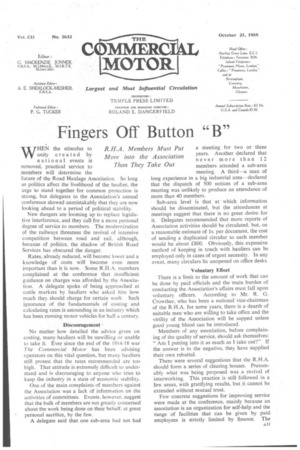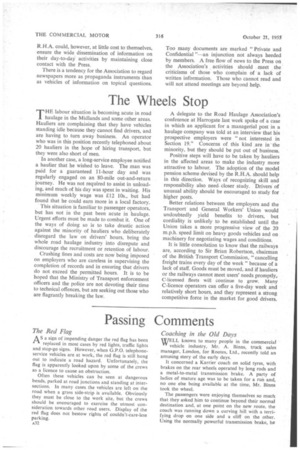Fingers Off Button "B"
Page 33

Page 34

If you've noticed an error in this article please click here to report it so we can fix it.
WHEN the stimulus to unity created by national events is removed, practical service to members will determine the future of the Road Haulage Association. So long as politics affect the livelihood of the haulier, the urge to stand together for common protection is strong, but delegates to the Association's annual conference showed unmistakably that they are now looking ahead to a period of political stability.
New dangers are looming up to replace legislative interference, and they call for a more personal degree of service to members. The modernization of the railways threatens the revival of intensive competition between road and rail, although, because of Politics, the shadow of British Road Services has obscured the danger.
Rates, already reduced, will become lower and a knowledge of costs will become even more important than it is now. Some R.H.A. members complained at the conference that insufficient guidance on charges was afforded by the Association. A delegate spoke of being approached at cattle markets by hauliers who asked him how much they should charge for certain work. Such ignorance. of the fundamentals of costing and calculating rates is astounding in an industry which has been running motor vehicles for half a century.
Discouragement No matter how detailed the advice given on costing, many hauliers will be unwilling or unable to take it. Ever since the end of the 1914-18 war The Commercial Motor has been advising operators on this vital question, but many hauliers still protest that the rates recommended are too high. That attitude is extremely difficult to understand and is discouraging to anyone who tries to keep the industry in a state of economic stability.
One of the main complaints of members against the Association was a lack of information on the activities of committees. Events, however, suggest that the bulk of members are not greatly concerned about the work being done on their behalf, at great personal sacrifice, by the few.
A delegate said that one sub-area had not had a meeting for two or three years. Another declared that never more than 12 members attended a sub-area meeting. A third—a man of long experience in a big industrial area—declared that the dispatch of 500 notices of a sub-area meeting was unlikely to produce an attendance of more than 40 members.
• Sub-area level is that at which information should be disseminated, but the attendances at meetings suggest that there is no great desire for it. Delegates recommended that more reports of Association activities should be circulated, but, on a reasonable estimate of Is per document, the cost of sending a duplicated circular to each member would be about £.800. Obviously, this expensive method of keeping in touch with hauliers can be employed only in cases of urgent necessity. In any event, many circulars lie unopened on office desks.
Voluntary Effort There is a limit to the amount of work that can be done by paid officials and the main burden of conducting the Association's affairs must fall upon voluntary officers. According to Mr. R. G. Crowther, who has been a national vice-chairman of the R.H.A. for some'years, there is a dearth of suitable men who are willing to take office and the virility of the Association will be sapped unless good young blood can be introduced.
Members of any association, before complaining of the quality of service, should ask themselves: "Am I putting into it as much as I take out?" If the answer is in the negative, they have supplied their own rebuttal.
There were several suggestions that the R.H.A. should form a series of clearing houses. Presumably what was being proposed was a revival of interworking. This practice is still followed in a few areas, with gratifying results, but it cannot be extended without mutual trust.
Few concrete suggestions for improving service were made at the conference, mainly because an association is an organization for self-help and the range of facilities that can be given by paid employees is strictly limited by finance. The R.H.A. could, however, at little cost to themselves, ensure the wide, dissemination of information on their day-to-day activities by maintaining close contact with the Press.
There is a tendency for the Association to regard newspapers more as propaganda instruments than as vehicles of information on topical questions. Too many documents are marked "Private and Confidential "—an injunction not always heeded by members. A free flow of news to the Press on the Association's activities should meet the criticisms of those who complain of a lack of written infbrmation. Those who cannot read and will not attend meetings are beyond help.




































































































